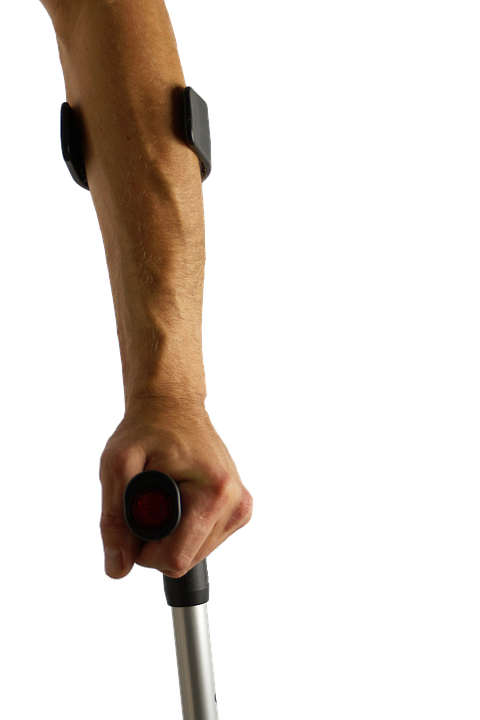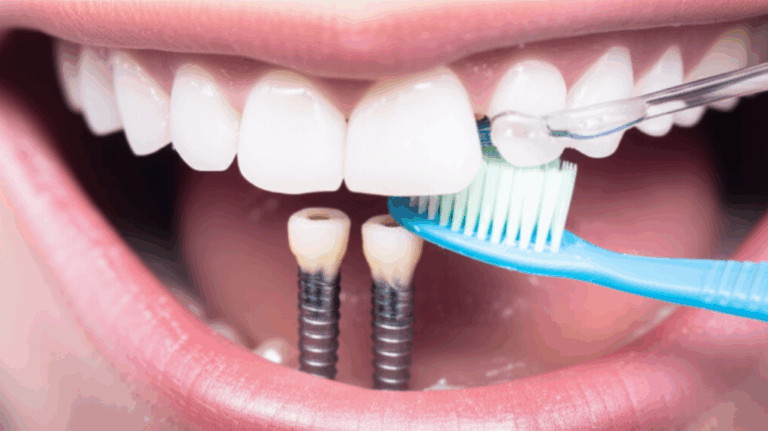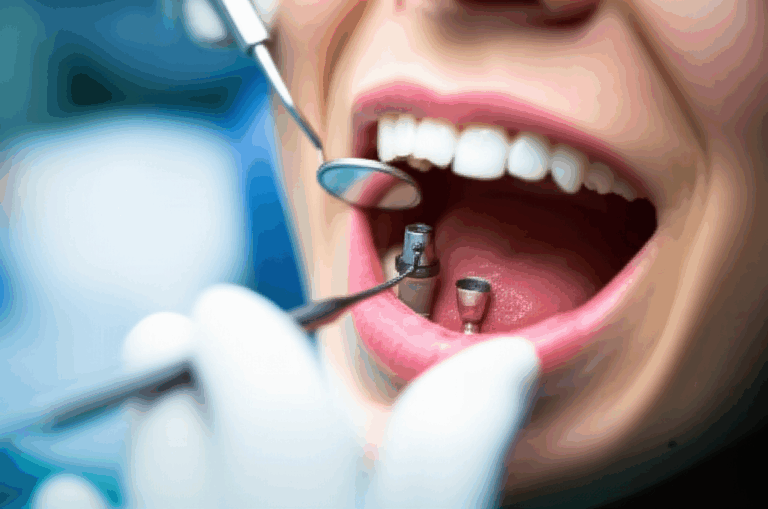
Can Dental Problems Cause Neurological Problems?
I use to think my mouth was its own thing, not connected to my body. A toothache was a toothache. Annoying, it hurt, but just a local problem. Go to dentist, get it fix. The idea that a bad tooth or gums could mess with my brain or my nerves, that seem like a sci-fi movie. But a few years ago, I had a health problem and it made me see something shocking. The health of your mouth is very connected to the health of your brain.
This article is my story of what I learned. We go deep into something most people dont think about until they have to. I’ll explain the science in a easy way, with no big words. I’ll share what dental problems are like warning signs and give you the plan I made to keep me safe. If you ever had problems you cant explain, like brain fog, weird nerve pains, or headaches that dont go away, or if you just want to take care of your whole body, this is for you. What I found out might change how you think about your dental care forever.
Article Overview
- My Big Scare: When a Toothache Was Way More
- The Secret Paths: How Germs from Your Mouth Get to Your Brain?
- Common Dental Problems and Their Brain Warning Signs
- Sicknesses You Wouldn’t Think Are Linked to Your Teeth
- Taking Charge: My Plan to Protect My Mouth and My Brain
- Some Final Good Words on My Trip
My Big Scare: When a Toothache Was Way More
My trip into this stuff wasn’t for school. It started with a dull ache in my jaw that wouldn’t stop and a feeling of being… cloudy. For months, I felt like I was running on low battery. I couldnt focus, I had trouble finding words when I talked, and I was always kind of tired that coffee didnt help. With this brain fog, I started to get weird, quick tingling feelings on the side of my face.
So I went to my doctor. We did blood tests, talked about my stress, and checked for low vitamins. Everything was normal. They told me it was probably stress or I needed more sleep. That was nice advice, but it felt wrong because I knew something was off. I felt like a detective in a mystery where I was the only one who think a crime happened.
The whole time, a molar on my top left side was complaining a little. It had a root canal a long time ago and a crown on it, so I didnt think about it. My dentist even took a x-ray at my last checkup and said it look fine. But as the nerve problems kept happening, a small voice in my head kept saying, “What if it’s your tooth?”
I was frustrated and would try anything. I got a second opinion from a dentist who worked on harder cases. He didnt like the normal 2D X-ray. Instead, he got me a Cone Beam Computed Tomography (CBCT) scan. It makes a 3D picture of the teeth, jaw, and stuff around it. And it was there. The scan showed a dark spot at the root tip of my "fine" tooth—a hidden, small, long-term infection that was there for years. It wasnt big enough to make me scream in pain, but it was a factory for swelling and germs, putting bad stuff into my body 24/7.
The second he showed me the picture, it all made sense. It wasn’t just in my head. There was a real, body reason for my brain fog and face tingling. We decided to pull the tooth. The weeks after he took it out were like a big reveal. The brain fog started to go away like real fog in the morning sun. The face tingling went away. You couldnt deny it: the infection in my jaw was messing with my brain. This whole thing sent me to do a lot of research to understand how this could even be.
The Secret Paths: How Germs from Your Mouth Get to Your Brain?
It’s easy to think your mouth is like Las Vegas—what happens there, stays there. But our bodies dont work that way. Your mouth is a busy city of germs, good and bad, and it has a few highways that go to the rest of your body, even your brain. I learned there are three main ways trouble can get around.
The Direct Way: Bloodstream Attack (Bacteremia)
Think about your gums. Theyre full of little blood vessels. When your gums are healthy, they make a tight wall around your teeth, keeping germs out of your blood. But when you have gum disease (gingivitis or the worse one, periodontitis), your gums get swoll up, red, and weak.
Every time you brush, floss, or even chew hard food, you can make tiny rips in this weak gum. This lets mouth germs get right into your blood. This is called bacteremia. For a healthy person, your body’s defenses usually cleans up these germs fast. But with a long-term tooth infection or bad gum disease, this happen all the time. It’s like a slow leak in a pipe. A constant drip of bad germs travels in your body, and some of these germs can get past the special wall that protects your brain, the blood-brain barrier.
The Nerve Highway: The Trigeminal Nerve Link
This way really blew my mind and probably was why I had face tingles. Your face and mouth are connected by a huge nerve called the trigeminal nerve. It’s one of twelve big nerves that come right from the brain, and it has three main parts that let you feel your forehead, cheeks, and jaw—and your teeth.
Think of this nerve as a superhighway from your mouth right to your brain headquarters. Studies showed that some viruses (like herpes) and germs can travel right along the nerve itself, skipping the blood. An infection at a tooth root, like mine, is right next to little parts of this nerve. The germs can basically "climb" the nerve, causing swelling and problems when they get near the brain. This can give you nerve pain, a droopy face, or the weird tingling I felt.
The Swelling Chain Reaction: Your Body’s Defense System Goes Crazy
This third way is maybe the most sneaky. A long-term dental infection, especially gum disease, makes your body’s alarm system on all the time. Your body keeps making swelling molecules called cytokines to fight the infection in your mouth.
The problem is, these cytokines dont just stay in your mouth. They get in your blood and make a low-level swelling all over your body. It’s like your body’s fire alarm is always on, but quiet. This long-term swelling is known to help cause almost every big sickness, from heart disease to diabetes.
For the brain, this all-over swelling is real bad news. It can make the blood-brain barrier weaker, so more bad stuff and germs can get in. It can also cause swelling inside the brain itself (neuroinflammation), which is now seen as a big part of getting sick with things like Alzheimer’s disease, Parkinson’s, and even feeling sad or worried all the time. My brain fog was probably because my body was swimming in this swelly soup, and it all started from one bad tooth.
Common Dental Problems and Their Brain Warning Signs
Once I understood the paths, I wanted to know what specific problems to watch for. It turns out, some common dental problems are well-known for causing body issues. Knowing them is the first step to stop them.
Gum Disease (Periodontitis): The Quiet Swelling Threat
This is a big one. Periodontitis is a bad gum infection that hurts the soft parts of your mouth and can wreck the bone that holds your teeth if you dont treat it. The main germ that cause it, Porphyromonas gingivalis, is real nasty. It doesn’t just make things swell; scientists have found this exact germ in the brains of people with Alzheimer’s disease.
Brain Warning Signs: The link here is often hard to see. It’s not a sudden, sharp pain. It’s more like your thinking gets slowly worse. You might notice your memory is not as good, its hard to focus, or you have that same brain fog that’s always there like I did. Because it happen slow, it’s easy to say it’s just getting older, but it could be a sign that the swelling from your gums is hurting your brain.
Abscessed Teeth: Pockets of Infection with Big Problems
An abscess is a pocket of pus from a germ infection. It can be at the tip of the tooth root (like mine) or in the gums next to a bad tooth. This is a strong source of infection. An abscess is like a ticking bomb.
Brain Warning Signs: In real bad, sudden cases, the infection from an abscess can go right to the brain and cause a deadly brain abscess or meningitis. The signs would be bad, like a high fever, a killer headache, stiff neck, and being confused. But a long-term, low-level abscess can give you more quiet brain signs like headaches that dont go away, face pain, or just feeling sick and tired all the time, as your body is always fighting the hidden infection.
Root Canals: A Good Fix, but What If They Go Bad?
A root canal is a fix to save a tooth that’s really infected or rotten. The dentist takes out the inside nerve, cleans it, and seals it up. When it’s done perfect, it works. But teeth are super complex, with tiny little tubes coming off the main part. It’s almost impossible to clean every single one.
If any germs are left, or if the seal breaks later, they can grow inside the dead tooth, safe from your body’s defenses. This makes a long-term infection that leaks bad stuff into your jawbone and blood.
Brain Warning Signs: This is one of the hardest things to find because normal X-rays miss it, like with me. The signs are often not clear and affect your whole body: always tired, joint pain, sicknesses that feel like your body is attacking itself, and of course, brain problems like brain fog, feeling sad, or worried. If you have a root canal tooth and health problems you cant explain, it’s worth checking it with a 3D CBCT scan.
Impacted Wisdom Teeth: More Than Just a Pain in the Jaw
Wisdom teeth are the last ones to come in. Because our jaws are often too small for them, they can get impacted—stuck under the gums or growing sideways.
A stuck wisdom tooth can be a place for trouble. It can make a pocket where germs grow, leading to an infection called pericoronitis. Cysts can also grow around them, which can hurt the jawbone and press on nerves nearby.
Brain Warning Signs: The most common brain sign from a stuck wisdom tooth is pain that travels along the trigeminal nerve. This can feel like headaches that wont quit, earaches, and sharp, shooting pains in your face. Sometimes, the pressure from a cyst can make your lip, chin, or tongue feel numb or tingly.
Sicknesses You Wouldn’t Think Are Linked to Your Teeth
The links go even deeper, connecting mouth health to some of the most serious brain sicknesses. This is new information that is making doctors and dentists work together more.
Trigeminal Neuralgia: The "Suicide Disease" and Its Tooth Triggers
Trigeminal Neuralgia (TN) is a horrible sickness with super painful, electric shock-like pains in the face. It’s often started by simple things like talking, smiling, or a light wind. While the main cause is often a blood vessel pushing on the trigeminal nerve near the brain, tooth problems are a huge factor that people miss. An abscess, a hidden infection from a root canal, or even a filling that’s too high and messes up your bite can bother a part of the trigeminal nerve. This can either copy the signs of TN or make a real TN attack happen. Many people have had teeth pulled for no reason trying to stop the pain, but the trigger was something else.
Alzheimer’s Disease and Dementia: The New Mouth Health Link
This is maybe the most serious link of all. For years, scientists have been finding proof that links bad mouth health, especially periodontitis, to Alzheimer’s disease. Like I said, the germ P. gingivalis has been found in the brains of Alzheimer’s patients. This germ makes poison stuff called gingipains, which have also been found in brain tissue and are known to be poison to nerves.
The idea is that long-term gum disease lets this germ and its poisons get into the brain over and over for many years. This helps cause the brain swelling and the buildup of amyloid plaques that are the signs of Alzheimer’s. It’s not the only cause, but the proof is so strong now that keeping your mouth super clean is seen as a key way to protect your brain for a long time.
Headaches and Migraines: Could Your Jaw Be the Reason?
If you have headaches or migraines all the time and cant find why, you need to look at your jaw. Temporomandibular Joint Disorder (TMD or TMJ) hurts the joints that connect your jawbone to your skull. When these joints are swoll up or not working right because of a bad bite, teeth grinding (bruxism), or an injury, the pain doesnt just stay in your jaw.
The jaw muscles are some of the strongest in your body. When they are tight all the time, they can send pain to your temples, forehead, and the back of your head. This can start tension headaches and even migraines. I learned to check if my headaches were worse in the morning—a classic sign of grinding your teeth at night.
Taking Charge: My Plan to Protect My Mouth and My Brain
This whole thing was scary, but it also made me feel powerful. It teached me I had more control over my health than I thought. I made a simple plan that I must do to make sure this never happened again.
Step 1: Changing My Daily Dental Care
My old way was brushing two times a day, and flossing… sometimes. That wasnt gonna be enough. My new routine is a must-do.
- Good Brushing: I use a soft electric toothbrush and make sure I point it at the gum line where bad stuff builds up. Two whole minutes, every time.
- Daily Flossing: No excuses. I learned flossing isn’t about getting food out; it’s about breaking up the groups of germs that grow between the teeth.
- Tongue Scraping: A lot of germs live on your tongue. Scraping it every morning helps lower the amount of germs in your mouth.
- Warm Salt Water Rinses: I do this a few times a week. It’s a nice, natural way to make gums feel better and less swoll.
This kind of dental care isn’t just to stop cavities; it’s about taking care of the whole environment of my mouth to help my whole body’s health.
Step 2: Finding the Right Dental Team and Why It’s Important
My story teached me that not all dentists are the same. I looked for a dentist who knowed about the mouth-body connection. I needed a partner for my health, not just a tooth fixer. Regular check-ups are now a must-have part of my health money.
I also learned how good new machines are. When I needed a new crown for another tooth, my new dentist showed me how they worked with a digital dental lab. They used a scanner to make a perfect 3D model of my tooth, and the lab used that to make a crown that fit perfect. A perfect fit is very important to stop bite problems that can lead to TMJ and headaches. Some of the best new teeth are made from special stuff, and finding a dentist who works with a special emax dental lab, for example, can mean getting a crown that is super strong and also looks good.
Step 3: Getting Good teeth information and Being Your Own Boss
You are the boss of your own health. It’s important to ask questions and find good teeth information. When a dentist says I need something done, I now ask:
- "What is all my choices?"
- "What is the good and bad things for each choice for a long time?"
- "What stuff will you be using, and why?"
- "Do you see any signs of swelling or stress in my mouth I should know?"
Being a part of your own care is key. Dont be scared to ask for a 3D scan if you have a weird tooth or problems you cant explain. It’s your body and your brain.
Step 4: Listening to My Body’s Signs
Most important, I learned to never again ignore what my body is trying to tell me. A toothache that stays, bleeding gums, bad breath that dont go away, a clicking jaw—these are not small things. They are warning signs. And if you have those signs with brain or body problems you cant explain, you have to connect them. Tell your doctor about your tooth problems, and tell your dentist about your health problems. You might be the one who has to make them talk to each other.
Some Final Good Words on My Trip
The human body is not a bunch of separate parts. It is one big system where everything is linked, an amazing system. The mouth is not an island; it is the main door, a key place that changes the health of everything else, especially the brain.
My trip from brain fog and being scared to seeing clear and feeling strong was built on this simple but big idea. Taking care of your teeth and gums isn’t just for a nice smile. It is a really important way to care for your whole body and one of the most important things you can do to protect your brain for your whole life. I hope my story make you look at your own health in this new way and to do something. Your brain will say thank you.








